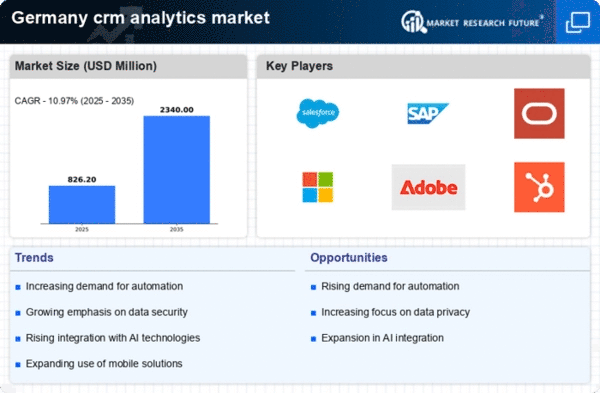Shift Towards Cloud-Based Solutions
The shift towards cloud-based solutions is transforming the crm analytics market in Germany. Organizations are increasingly adopting cloud technologies to enhance their analytics capabilities, allowing for greater flexibility and scalability. This transition is driven by the need for real-time data access and collaboration among teams. Reports indicate that cloud-based crm analytics solutions have seen a growth rate of approximately 40% in the past year among German firms. The ability to access analytics tools from anywhere facilitates better decision-making and responsiveness to market changes. As businesses continue to embrace digital transformation, the crm analytics market is likely to expand, fueled by the demand for cloud-based solutions that support agile and data-driven strategies.
Growing Demand for Customer Insights
The crm analytics market in Germany is experiencing a notable surge in demand for customer insights. Businesses are increasingly recognizing the value of data-driven decision-making, which is leading to enhanced customer engagement and retention strategies. According to recent studies, approximately 70% of companies in Germany are investing in analytics tools to better understand customer behavior and preferences. This trend is likely to continue as organizations seek to leverage data to gain a competitive edge. The ability to analyze customer interactions and feedback allows businesses to tailor their offerings, thereby improving customer satisfaction. As a result, the crm analytics market is poised for growth, driven by the need for actionable insights that can inform marketing strategies and product development.
Integration of Advanced Technologies
The integration of advanced technologies such as machine learning and artificial intelligence is significantly influencing the crm analytics market in Germany. These technologies enable businesses to automate data analysis processes, leading to more efficient operations and improved accuracy in customer profiling. Reports indicate that the adoption of AI-driven analytics tools has increased by over 50% in the last two years among German enterprises. This shift not only enhances the capabilities of crm systems but also allows for predictive analytics, which can forecast customer behavior and trends. Consequently, organizations are better equipped to make informed decisions, thereby driving the growth of the crm analytics market as they seek to optimize their customer relationship strategies.
Regulatory Compliance and Data Security
In Germany, the crm analytics market is significantly impacted by the stringent regulatory environment surrounding data protection and privacy. The implementation of the General Data Protection Regulation (GDPR) has compelled businesses to prioritize compliance in their analytics practices. As a result, companies are investing heavily in secure analytics solutions that ensure data integrity and confidentiality. It is estimated that around 60% of organizations in Germany are enhancing their data security measures to align with regulatory requirements. This focus on compliance not only protects customer data but also builds trust, which is essential for long-term customer relationships. Thus, the crm analytics market is likely to expand as businesses seek solutions that meet both analytical needs and regulatory standards.
Rising Importance of Customer Experience
The crm analytics market in Germany is increasingly driven by the rising importance of customer experience. Companies are recognizing that a positive customer experience is crucial for brand loyalty and retention. As such, there is a growing emphasis on utilizing analytics to enhance every touchpoint in the customer journey. Recent surveys indicate that over 75% of German businesses are prioritizing customer experience initiatives, which often rely on sophisticated analytics tools to gather insights. This trend suggests that organizations are willing to invest in crm analytics solutions that provide a comprehensive view of customer interactions. Consequently, the crm analytics market is expected to grow as businesses strive to create personalized experiences that resonate with their customers.
















